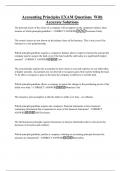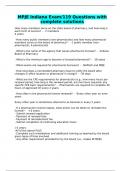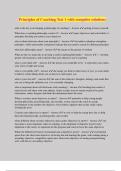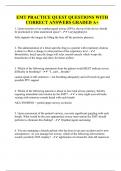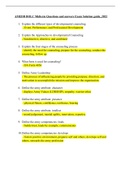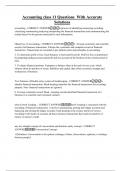INCLUDES notes from Jack Snyder’s article “One World, Rival Theories” (Total: 5 pages).
1
“One World, Rival Theories” by Jack Snyder - Notes
Table of Contents
Is Realism Still Realistic? 2
The Divided House of Liberalism 3
Idealism’s New Clothing 3
Stumped by Chance 4
, 2
Classic theories have a lot to say about the IRs (International Relations) study:
● Academia has adjusted existing theories to meet new realities. The three dominant familiar
approaches shape public discourse and policy analysis.
1. Realism: Focuses on the shifting distribution of power among states. It instils a
pragmatic appreciation of the role of power but also warns that states will suffer if
they overreach - “Dwell on the balance of power.”
2. Liberalism: Highlights the rising number of democracies and the turbulence of
democratic transitions. Points out the cooperative potential of mature democracies
(especially with effective institutions), but also notes democracies’ tendency to
crusade against tyrannies and the propensity of emerging democracies to collapse into
violent ethnic turmoil - “Dwell on the power of international trade and democracy.”
3. “Constructivism”: An updated form of idealism that illuminates changing norms of
sovereignty, human rights, and international justice as well as increased potency of
religious ideas in politics. Idealism stresses that a consensus on values must underpin
any stable political order, but also recognizes that forging such a consensus often
requires an ideological struggle with potential for conflict - “Debates about the ideas
that are fundamental blocks on international life.”
Is Realism Still Realistic?
Realism: The belief that international affairs are a struggle for power among self-interested states.
However, is not a theory of despair/unethical:
● Clear-sighted states can mitigate the causes of war by finding ways to reduce the dangers
posed to each other.
● It advocates that a ruthless pragmatism about power leads to a more peaceful/ideal world.
In liberal democracies, realism is the theory that everyone dislikes. It was developed by European
émigrés after World War Two (WWII) and used mostly by United States (US) theorists. However, it
also has a broad appeal outside.
➔ In the contemporary world, realism has a continued centrality of military strength and the
persistence of conflict (i.e. states that become more and more powerful will eventually try to
expand their sphere of domination for security, wealth, etc..).
➔ The importance of non-state actors challenges the assumptions of realism.
Realism’s Core Concept: The balance of power predicts that weaker states will ally to protect
themselves from stronger ones; they will form and reform a balance of power. Policies must also be
based in positions of real strength and foreign policy must be more calculated and sensible.
E.g. Germany was a very strong world power in the 19th Century, which led to France, Russia and
Britain later unifying.


